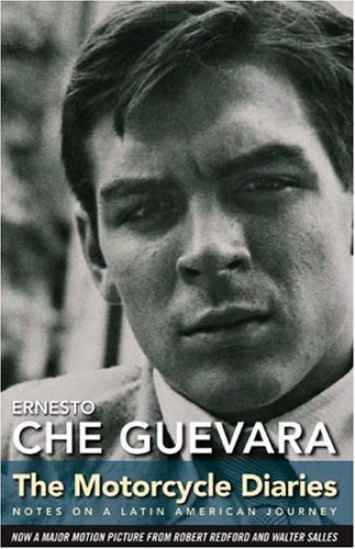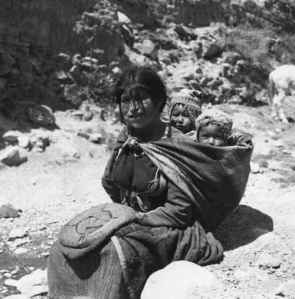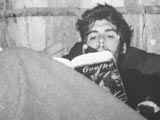Motorcycle Diaries
 Motorcycle Diaries is a movie about Ernesto “Che” Guevara and Alberto Granado‘s travels through Latin America. The journey exposed these two young men to the intense poverty and social injustices that plagued much of the continent. It is this exposure that is said to have awakened Che’s revolutionary spirit.
Motorcycle Diaries is a movie about Ernesto “Che” Guevara and Alberto Granado‘s travels through Latin America. The journey exposed these two young men to the intense poverty and social injustices that plagued much of the continent. It is this exposure that is said to have awakened Che’s revolutionary spirit.
Eduardo Elena’s article Point of Departure: Travel and Nationalism in Ernesto Guevara’s Argentina, points out that this was not Guevara’s first exposure to travel. In fact during his teens and early twenties Guevara traveled across Argentina by hitchhiking, bicycling and other means. Director Walter Salles does not touch on these earlier travels, which definitely played a part in shaping Guevara’s criticism against established class norms, cultural expectations and political trends.
During the 1950’s Argentina experienced a time of internal migration. Rural populations were moving to the cities looking for jobs in the industrial, commercial and government fields. In the film Guevara and Granado meet a man and a woman who lost their farm to a speculator, which led them to travel in search of a job. They tell Guevara that they had been chased away by police because they are communist and now they were looking to get a job at the mines because no one cares if they are communist since the work is so dangerous. Guevara is moved by this couple and the hardships that they have endured, and curses the insensitivity of the mine foreman that chooses the new workers.
Drinot’s article Awaiting the Blood of a Truly Emancipating Revolution- Che Guevara in 1950’s Peru suggests Guevara’s travels in Peru would have had a profound impact on his views of the world. It is in Peru that Guevara would experience the hardest natural elements, hunger and asthma attacks that would also influence his politically radical views. Peru’s indigenous people, as viewed by Guevara were subjected to racism and a violent social order that could care less about them. Drinot portrays Guevara as being sympathetic to the Andean peoples but also as having racist views. Guevara is said to have compared their “behavioral characteristics to animals:” and even said “we are like demigods to these simple people.” Guevara would note later that these were a people of a defeated race. Their negative traits are a product of that defeat.
On one of his encounters Guevara is asked by a linyera (vagabond, wanderer) why he is on the road. He tells of his planned adventure with Granado, and the linyera is amazed that someone would travel for leisure. Tourism in Argentina during this time became very popular. The Peron government encouraged travel to help boost Argentina’s economy. New labor legislation, gave shorter work weeks, paid holidays and vacations to the industrial working class and state employees. The national and provincial governments would also get in the business of opening resorts, making national parks which could be visited using subsidized train fares. Guevara disliked the common traveler, and would alienate himself and his travels by stating  that he was someone who was dedicated to the inner workings of society not someone on a holiday.
that he was someone who was dedicated to the inner workings of society not someone on a holiday.
Traveling was not Guevara’s only means of self education and exposure. As a teenager, Guevara had bouts of illness and complications from asthma. It was during these confinements that Guevara would immerse himself in books. I wonder if his extensive readings inspired his young mind to emulate the figures that he read about.
 As an eclectic reader, Guevara read books by leftist authors, which included Karl Marx. Reading and writing would become to some extent a passion of Guevara. Drinot mentions that on Guevara’s second trip to Peru he is stopped at the border of Bolivia, where the police confiscate some of his books for being “red”. Peruvian police were afraid that Bolivian agitators would try to bring the revolution into Peru. Guevara would convince the guards that this was not their intention and was able to keep his books. It has been written that even in his lasts days Guevara was known to have on him his journal and a book. And it was not uncommon to see him in a tree reading or writing.
As an eclectic reader, Guevara read books by leftist authors, which included Karl Marx. Reading and writing would become to some extent a passion of Guevara. Drinot mentions that on Guevara’s second trip to Peru he is stopped at the border of Bolivia, where the police confiscate some of his books for being “red”. Peruvian police were afraid that Bolivian agitators would try to bring the revolution into Peru. Guevara would convince the guards that this was not their intention and was able to keep his books. It has been written that even in his lasts days Guevara was known to have on him his journal and a book. And it was not uncommon to see him in a tree reading or writing.
Motorcycle Diaries told a romantic story of the beginning of a young man’s evolution. An evolution that would involve travels, literature, people and journals. From this evolution “Che” would emerge as a man that would be on the side of people, willing to give his life to fight for their rights
